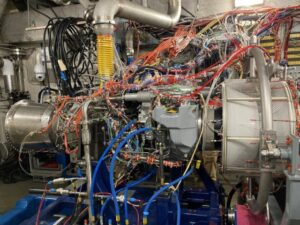NASHVILLE, Tenn. — The Army is targeting November for delivery of the first Improved Turbine Engine Program (ITEP) engines, built by General Electric Aviation [GE], to the two competitors vying for the Future Attack Reconnaissance Aircraft (FARA) program.
Brig. Gen Rob Barrie, program executive officer for aviation, told reporters at the Army Aviation Association of America annual conference here that delivery of the ITEP engine later this fall sets the path for first flight of the FARA competitive prototypes in 2023.

“There’s a pathway for them to fly in ‘23. There’s risk associated with that. But it’s all hands on deck to manage and mitigate those risks,” Barrie said. “In the interim, though, we haven’t slowed down with the build of two competitive prototypes. They’re [both] about 80 percent built, albeit without the engine yet”
The Army has selected Bell’s [TXT] 360 Invictus and Sikorsky’s [LMT] Raider X designs for the FARA competitive prototyping (CP) phase as it looks to field a new scout attack helicopter.
GE Aviation was awarded a $517 million contract in February 2019 to develop its T901 engine for ITEP, which will be the future engine for FARA as well as the Army’s AH-64 Apache and UH-60 Black Hawk helicopters (Defense Daily, Feb. 1 2019).
Barrie said delays on the engine program “challenged the original schedule that we had” for the FARA competitive prototypes, while he cited the recent “first engine to test” for ITEP as a significant milestone as the program moves forward.
“The good news is that General Electric has achieved the significant milestone of lighting off that first engine. That occurred last week. And, actually, over the course of the last week, they’ve run about seven hours on the engine, to include some portion of time at max power,” Barrie said.
GE Aviation noted last month that testing of the first T901 engine is being performed in a newly upgraded test cell at its Lynn, Massachusetts facility, and will include running “a number of simulated flight conditions to collect performance data of the highly instrumented test engine” (Defense Daily, March 24).
The “first engine to test” (FETT) for ITEP was originally slated for late fiscal year 2021, but was pushed into this year due to COVID-related delays.
“I think the [GE] team has fought through a tremendous amount of adversity for what is arguable one of our most important technologies going into FARA, which is this transformational engine,” Maj. Gen. Walter Rugen, director of the Army’s Future Vertical Lift Cross Functional Team, told reporters.